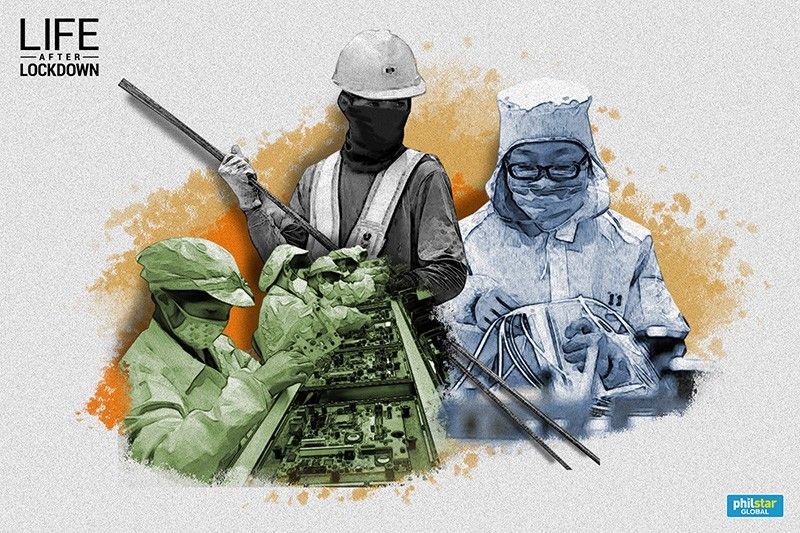Life After Lockdown: On-site work resumes for many but employers compelled to rethink arrangements

Philstar.com's Life After Lockdown is a compendium of references on Filipinos' shift to a new normalcy during a coronavirus pandemic.
MANILA, Philippines — It's business unusual for many companies in the Philippines that are antsy to reopen but also anxious over risks related to COVID-19.
As some areas in the Philippines transition to general community quarantine, the government has set guidelines to prevent the spread of the coronavirus in the workplace.
Alternative work arrangements: The Department of Trade and Industry and the Department of Labor and Employment released interim guidelines on the prevention and control of COVID-19 in offices, factories and other sites.
Private companies are also urged to consider alternative work arrangements such as:
- Swinging shifts, which the DTI and DOLE called "working hour shifts" — employees fulfill their work hours in movable or flexible shifts instead of maintaining a fixed time-in and -out, such as a 9 a.m. to 6 p.m. workday from Monday to Friday.
- Work-from-home, where feasible — part or a majority of the workforce report remotely using digital interfaces with their colleagues and teams
- Rotational system — a percentage of a company's workforce physically report for work for one or two weeks, and then switch to remote work the following week
- Other modes that companies can adopted are flextime, compressed workweek, job sharing and reduced hours, each having a different set of benefits and disadvantages for the worker and employer.
Employers are also encouraged to provide shuttle services and or decent accommodation in locations not far from the workplace to lessen traveling and movement, the agencies noted.
Minimize contact rate: The DTI and DOLE discourage prolonged face-to-face interaction between workers and clients. Masks should also be worn at all times and not removed.
- A minimum number of participants, with short durations, should be kept if meetings need physical presence.
- For lengthy discussions, workers should use videoconferencing.
- Office tables should also be arranged to maintain proper physical distancing. Barriers may be placed between tables.
- Layout of workstations should consider unidirectional movement in aisles, corridors or walkways.
- People inside an enclosed space, such as a room, store or hall should be limited to maintain physical distancing.
- The number of persons inside an elevator shall also be limited to observe one-meter physical distancing.
- Using stairs is encouraged to observe proper social distancing requirements. If two stairways are available, one should be used exlusively for going up and the other for going down.
- The government highly encourages using an online system for clients needing assistance from offices, including the use of videoconferencing.
- There should always be roving officers to ensure physical distancing and observance of minimum health protocols.
Which sector or industries are allowed to operate?
- Work in government offices may resume at full capacity or under alternative work arrangements in accordance with the Civil Service Commission's rules and regulations.
- Essential public and private construction projects, such as water services facilities, digital works, health facilities and priority projects will also be allowed to operate in accordance with the Department of Public Works and Highway's guidelines.
| Industries/sectors allowed to operate | ||
|---|---|---|
| Full capacity | 50% to full capacity | Maximum of 50% work-on-site arrangement |
|
|
|
Not allowed: Amusement, gaming and fitness establishments, including the children and tourism industries, are not allowed to operate in areas under the GCQ.
- Hotels or similar establishments will also not be allowed to operate except for those accommodating:
- For areas outside Luzon, guests who have existing booking accommodations for foreigners as of May 1,
- Guests who have existing long-term bookings,
- Distressed overseas Filipino workers and stranded Filipinos or foreign nationals,
- Repatriated OFWs in compliance with approved quarantine protocols,
- Non-OFWs required to undergo mandatory facility-based quarantine and
- Healthcare workers and other employees exempted under the IATF guidelines.
Commuting and land transport • Movement of people • Industries • Air travel • Education • Reopening of industries and workplaces • Work-from-home setup • Digital economy • Government services • Courts, cases and law enforcement • Religious services and churches • Sports interactions • Sports • Local sports leagues • Dining and beverage • Television, movies, music and events
- Latest
- Trending



























